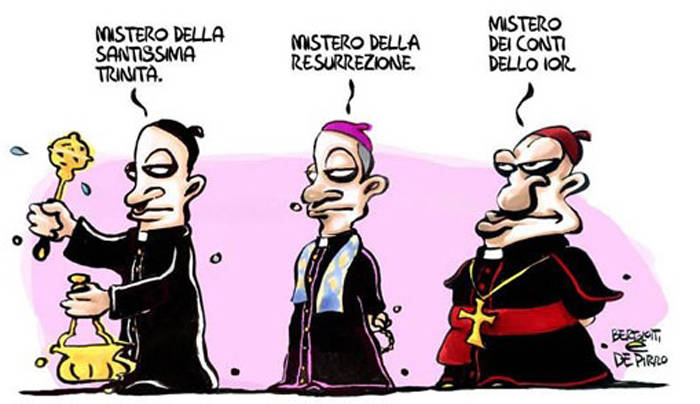Vatican Passes Money Laundering Test (Sort of)
ROME - Although the Vatican has long maintained that the IOR is not a bank in the usual sense, it nevertheless walks like a bank and talks like a bank, with some $7.6 billion in deposits. The IOR is anxious to win high marks from MONEYVAL, whose assessment reports are shared with and accepted by the World Bank and the IMF, among others.
The Council of Europe's committee evaluation has loomed all the more important for the IOR because the Vatican bank has been plagued by recent and widely publicized scandals, triggered in part by a still unexplained $23 million cheque. Once deposited in an Italian bank, the cheque drawn on the IOR fell under Italian jurisdiction and was automatically blocked by Italian authorities on grounds that it could represent possible money laundering.
"Instead of being on some Caribbean island, this [bank] is right in the middle of Europe, in the heart of Rome. Its business model depends on keeping things as shrouded as possible from all financial authorities. Capital gains are untaxed, financial statements are not disclosed and anonymity is guaranteed. The bank's exotic status of belonging to a religious monarchy in a sovereign state the size of a city park has shielded it from investigations and unpleasant external monitoring," sentenced Der Spiegel in a long analysis July 2.
Other serious observers agree. Last month the dissident Catholic theologian Hans Kung wrote of his feats that the IOR "will remain today as yesterday. on the black list of the banks who recycle dirty money.... It is not only the Pope's butler, but the systemic defects which make his betrayal possible. There is no transparency, from the naming of bishops to financial policy...and a habit of hiding the facts."
After the $23 million cheque was found, Italian prosecutors summoned IOR bank president Ettore Gotti Tedeschi for questioning about possible IOR violation of Italian anti-money laundering laws. Italian police territory also ransacked his office outside Vatican territory and reportedly uncovered names of Italians (not yet leaked, incidentally) holding accounts at the IOR. Gotti Tedeschi was apparently cooperative with the Italian prosecutors, but at this point, rightly or wrongly, he was sacked by a Vatican bank oversight committee.
Clearance by MONEYVAL could therefore go a long way toward restoring IOR prestige, and this week's session, July 2-6, was eagerly (and nervously) awaited in the Vatican. A full evaluation is yet to come, however. According to the Council of Europe's press release, "All states evaluated by MONEYVAL have the opportunity to check the accuracy of the amended version of the report after it has been adopted, and to provide any comments for publication." These Vatican "comments" are are not due until August, meaning that the full results will not by available until early autumn, when the committee's evaluation will appear on its website together with comments, if there are any, by its observer state representatives.
In the meantime, the straws in the wind are blowing the Vatican's way. Already, the IOR has indicated that it will not reveal any account information prior to April 2011, and this has been accepted. Prior to this week's session MONEYVAL inspectors sent its member states, including Italy, a list of 16 issues for evaluation. Italy reportedly passed on eight, meaning that half the requisites were not met. At Tuesday's session the number rose to a more acceptable nine out of 16. But at that point the experienced head of the Bank of Italy's Financial Intelligence Unit, Giovanni Castaldi, unexpectedly ordered the withdrawal of his representatives from the session. Curiously, the Italian government delegation was notably thin, lacking those most able to testify about the Italian justice inquiry that is currently underway. "The Italian government has put a gag on its anti-money laundering delegation in Europe in order to help the Vatican," according to reporter Marco Lillo, writing in Il Fatto Quotidiano.


































i-Italy
Facebook
Google+
This work may not be reproduced, in whole or in part, without prior written permission.
Questo lavoro non può essere riprodotto, in tutto o in parte, senza permesso scritto.